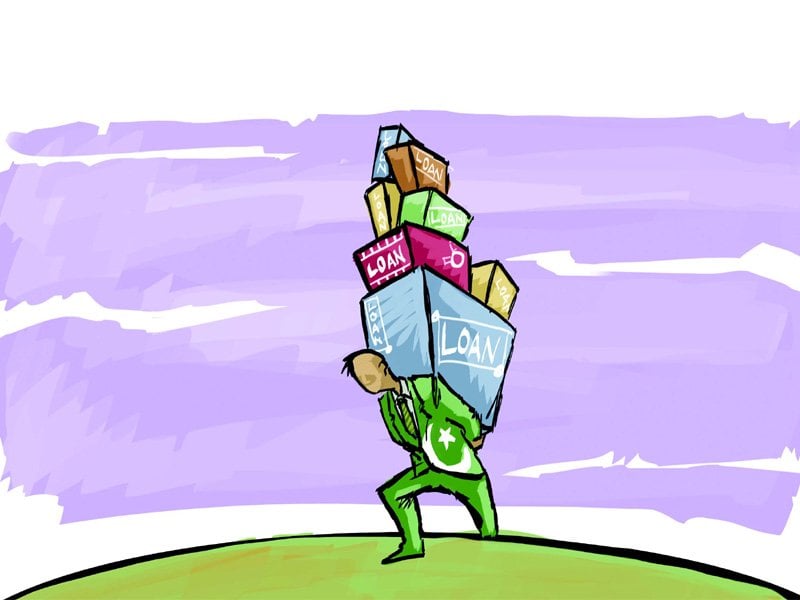
A team of World Bank ‘consultants’ has arrived in Pakistan to convince decision makers to avail a $300 million loan for a second phase of tax reforms. The group was also involved in the first phase of the same project, which the World Bank itself admitted was a “failed” one.
After the abortive $149 million Tax Administration Reforms Project, known as TARP-I, the World Bank has sent more or less the same team to devise a roadmap for TARP-II. Sources say that the project objectives will be more or less the same – enhancing tax revenues and introducing reforms in the tax machinery.
Michel Zarnowiecki, an expert in customs affairs, and William Mayville, an adviser on human resources training, are again in town to ‘tell’ how Pakistan can upgrade customs and border management in Pakistan and how it can strengthen its human resources base.
These two areas formed major components of the failed TARP-I initiative, which continued for almost seven years without achieving anything significant. Due to its disappointing outcomes, the World Bank, in diplomatic language, had admitted that the programme was “moderately unsatisfactory”, wherein the World Bank’s was “moderately unsatisfactory”, and the borrower’s performance was “unsatisfactory”.

Against the initial promise of $149 million, the World Bank’s actual disbursement was reduced to only $47.6 million. Despite coming away empty-handed, the country is nonetheless paying a 3.5% mark-up on the borrowed amount.
According to an official in the finance ministry, international lending agencies have been sucking the country dy. “Most of the money they give in the name of reforms is flown back to them as loan fees, consultant fees, and training and programme management fees,” he criticised.
The World Bank deducted $2.2 million (almost 5%) from the loan it earlier extended in the name of ‘capitalised charges’ and ‘loan origination fee’. Similarly, consultant services consumed $7.3 million, our sources said.
When Pakistan availed the TARP-I in 2004, its tax-to-GDP ratio was 11.5%. It slipped to a dismal 8.6% by the end of the first phase of the project. Another important objective – increasing electronic tax returns filers – remains an area where the Federal Board of Revenue’s (FBR) entire data is suspicious. As against 1.5 million supposed tax filers, the actual number was just above 800,000. According to another objective, tax arrears were supposed to be reduced. Instead of a reduction, the actual figure shot upwards many times the baseline.
The TARP-I team forced Pakistan to implement a ‘voluntary compliance’ method, instead of letting tax authorities go after taxpayers. Voluntary compliance means taxpayers declare their own taxable assets, instead of the authorities going after their personal accounts. According to an FBR official, this was the biggest flaw in the first phase of the project, which was subsequently exploited by tax dodgers.
“Due to an ‘imported’ self assessment scheme, the FBR has failed to reintroduce audits despite making three separate efforts in the recent past,” an official said. “Every time the FBR wants to initiate an audit, taxpayers challenge it in court on the grounds of ‘self assessment’.”
The Washington-based lending agency has already given $3 million for a project preparation facility (PPF) for TARP-II. Most of that amount will be paid to the same consultants who designed the first (faulty) programme.
While defending the proposed programme, the FBR says the next phase of tax reforms will look at areas which were not visited in the earlier phase of reforms. FBR Chairman Ali Arshad Hakeem said the handling of the first phase was the main cause of failure.
The Planning Commission has already opposed TARP-II, our sources said.
Published in The Express Tribune, February 23rd, 2013.
Like Business on Facebook to stay informed and join in the conversation.
COMMENTS (12)
Comments are moderated and generally will be posted if they are on-topic and not abusive.
For more information, please see our Comments FAQ





1719053250-0/BeFunky-collage-(5)1719053250-0-270x192.webp)











One man: Hafiz Shaikh. Former employee of the World Bank and part of the pro-US lobby in Pakistan. He reportedly prefers World Bank over Asian Development Bank even when World Bank gives Pakistan the worst loan terms. World Bank is nothing but a loan shark but they had their man in the office Mr. Hafiz Shaikh.
@BruteForce:
"Sounds like somebody does not want to pay the money back. India also contributes money to WB, Pakistan better pay up!"
Quite right! Pakistan has always tried to get the whole foreign debt written off. I still recall Abul Sattar, after 9/11 demanding that the global community forgive and write off Pakistan's then $40B foreign debt as a precondition to fight against the Al Quaeda and Islamic terror. While it may make occasional payments to avoid outright default, it uses the age old tactic of paying off Peter by borrowing more from Paul and keep repeating it. As a result, the foreign debt has ballooned to $80B.
@Fundyar: 1% loan component was cancelled, the interest rate on disbursed amount is 3.5%. Plz see Project completion report of TARP-I. Best
I note that Pakistan's credit rating has been classified as "junk" by Moody's as per this report: http://www.bloomberg.com/news/2012-07-13/moody-s-cuts-pakistan-credit-rating-deeper-into-junk.html I am not expecting this rating to improve (probably never) and my only advise to their leaders is to bring in harsh laws to start collecting taxes and impose proper democracy where everyone is judged by their talents and contributions and not by their religious background. This is 2013 and not the 7th century. If not, then will the last person leaving the room please switch off the lights. Its that bad.
Correction! The interest rate is less than 1% nd payable over 30 years so in NPV terms its interest free!
the fact is the nature of Pakistani people is corrupt - nobody will pay tax (especially our leaders)......mullah zia,zab layed the foundations of a backward mullah society and now we are paying the price
They will keep offering countries like Pakistan because they understand our weaknesses far better than we do.
World Bank should not burden this nation with second instalment of TARP when the first one was failure.Please look at the World Bank post TARP-1 report Please wait for new political set-up and thenarticulate with them their long term vision of reformiong the tax system
TARP 1 lead to lower tax to GDP ratio, lower number of tax payer and other than capital expenditure the loan /grant amount was not utilised. Post TARP 1 completion report showed that the programme objectives were not met. Please do not burden the country with additional loans. FBR in it's present form is dysfunctional and is not capable of bringing any substantial reforms to improve the tax system. As the saying goes: FBR is Beyond Reform
The thing is if taxes are paid by all sectors who will need these loans.
What a waste of national resources.World Bank gives loans that have to be returned What did TARP 1 give: 5,30,000 business returns? and only 15,000 people in the country paying more than Rs 5,00,000 as taxes?. 100 companies paying over 80% of total sales tax collection 70% taxes coming from tax deductions!
Sounds like somebody does not want to pay the money back. India also contributes money to WB, Pakistan better pay up!